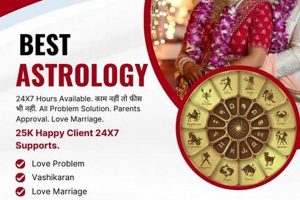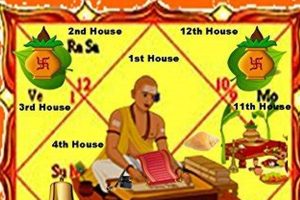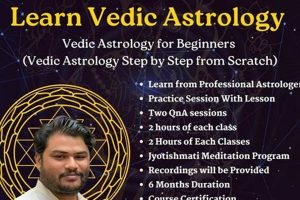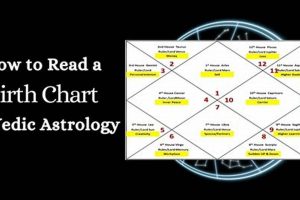The application of large language models, trained on vast datasets, to the domain of Vedic astrology offers a new approach to this ancient practice. This involves using these models to generate interpretations of birth charts, predict planetary influences, and provide insights based on Vedic astrological principles. For instance, a user might input their birth details, and the model could output an analysis of their personality, strengths, weaknesses, and potential future events according to Vedic astrology. This differs from traditional consultations, where interpretations are provided by human astrologers.
Automating aspects of Vedic astrological calculations and interpretations can make this complex system more accessible. This has the potential to introduce Vedic astrology to a wider audience and facilitate research within the field. Historically, access to qualified Vedic astrologers and personalized readings has been limited. The application of advanced computational models can potentially bridge this gap by providing readily available interpretations. Furthermore, this technological integration could lead to new research avenues, exploring correlations and patterns within Vedic astrology’s extensive framework.
This exploration delves further into the implications of this technological convergence, addressing the potential benefits, challenges, and ethical considerations surrounding the use of AI in Vedic astrology. It also examines the impact on traditional practitioners and the evolution of the practice in the digital age.
Tips for Utilizing AI in Vedic Astrology
Employing computational models in Vedic astrology requires careful consideration and understanding of both the technology and the astrological system. These tips provide guidance for effective and responsible utilization.
Tip 1: Verify Birth Chart Accuracy: Ensure accurate birth data (date, time, and location) is used as the foundation for any AI-driven analysis. Inaccurate birth data will lead to incorrect interpretations, regardless of the sophistication of the model.
Tip 2: Understand Model Limitations: Recognize that current models function based on existing Vedic astrological texts and interpretations. They cannot replace the nuanced understanding and intuition of a seasoned astrologer.
Tip 3: Focus on Self-Discovery, Not Prediction: View AI-generated insights as tools for self-reflection and understanding, rather than definitive predictions of the future. Vedic astrology offers a framework for understanding karmic influences, and AI can assist in exploring these influences, but outcomes remain subject to free will.
Tip 4: Cross-Reference with Traditional Interpretations: Compare AI-generated reports with classical Vedic texts and the insights of experienced astrologers. This helps validate the information and deepen understanding.
Tip 5: Respect Ethical Considerations: Use AI-driven Vedic astrology responsibly, avoiding applications that could lead to harm or misinformation. Treat the information with sensitivity and avoid making decisions solely based on automated interpretations.
Tip 6: Maintain Critical Thinking: Do not blindly accept AI-generated interpretations. Apply critical thinking and discernment, considering the information within the broader context of one’s life and experiences.
Tip 7: Seek Expert Guidance When Necessary: Complex astrological questions or life decisions warrant consultation with a qualified Vedic astrologer. AI tools can serve as a starting point but should not replace professional guidance.
By following these guidelines, individuals can leverage the potential of AI in Vedic astrology for self-growth and understanding while respecting the traditions and ethical implications of this ancient practice.
The integration of artificial intelligence into Vedic astrology offers a new frontier for exploration, presenting both opportunities and challenges. It is crucial to proceed with awareness and responsibility as this field continues to evolve.
1. Automated Interpretation
Automated interpretation lies at the core of applying large language models to Vedic astrology. It represents a significant shift from traditional consultations, offering new possibilities and raising important considerations regarding accuracy, accessibility, and the role of human interpretation.
- Algorithmic Analysis of Birth Charts
Algorithms process birth data (date, time, and location) to generate astrological charts and calculate planetary positions. This replaces manual calculations, significantly reducing the time required for chart preparation. While efficient, ensuring the accuracy of these algorithms is paramount, as errors in calculation can lead to inaccurate interpretations.
- Text-Based Interpretation of Astrological Data
Large language models, trained on vast datasets of astrological texts, can provide textual interpretations of birth charts and planetary transits. For example, the model might describe the influence of a particular planetary placement on an individual’s career or relationships. The challenge lies in ensuring that these interpretations align with established Vedic astrological principles and avoid generalizations.
- Accessibility and Scalability of Interpretations
Automated interpretation makes Vedic astrology more accessible to a wider audience. Individuals can obtain interpretations without needing to consult a human astrologer, potentially reducing costs and wait times. This scalability allows for a broader reach, but responsible use and guidance are essential to avoid misinterpretations and ensure ethical application.
- Potential for Bias and Misinterpretation
The training data used for large language models can influence the interpretations generated. If the training data contains biases or inaccuracies, these can be reflected in the automated interpretations. Further, the complexity of Vedic astrology requires nuanced understanding, and relying solely on automated interpretations without critical analysis can lead to misinterpretations and misapplication of principles.
These facets of automated interpretation highlight the transformative potential and inherent challenges of applying large language models to Vedic astrology. While offering increased accessibility and efficiency, responsible development and utilization are crucial to maintain the integrity and ethical application of this ancient practice. Balancing automated interpretation with human expertise and critical analysis is key to navigating this evolving landscape.
2. Accessibility
Accessibility in the context of Vedic astrology powered by large language models refers to the ease with which individuals can access astrological information and interpretations. Traditionally, access to Vedic astrology required consultations with qualified astrologers, often involving significant costs and scheduling constraints. The application of large language models transforms this landscape, potentially making Vedic astrological insights more readily available.
- Reduced Barriers to Entry
Utilizing large language models eliminates the need for direct consultations with astrologers, lowering financial and logistical barriers. Individuals can input their birth details into an application and receive an automated interpretation, circumventing the traditional consultation process. This opens Vedic astrology to a wider audience, including those who may not have previously had access due to financial constraints or geographical limitations.
- Increased Availability of Information
Automated systems can provide astrological information 24/7, unlike human astrologers with limited availability. This constant availability facilitates self-paced learning and exploration of Vedic astrology. Users can access information and interpretations at their convenience, fostering greater engagement with the subject.
- Potential for Global Reach
Language models can be trained in multiple languages, making Vedic astrology accessible to individuals across the globe. This transcends geographical and linguistic limitations, expanding the reach of Vedic astrological knowledge and fostering cross-cultural understanding of this ancient practice.
- Democratization of Astrological Knowledge
By making astrological interpretations more readily available, large language models democratize access to this knowledge. Individuals can engage with Vedic astrology independently, fostering self-discovery and personal growth without relying solely on expert intermediaries. This empowers individuals to explore their astrological profiles and integrate these insights into their lives.
The increased accessibility facilitated by large language models has the potential to transform the landscape of Vedic astrology. While these advancements offer significant benefits, maintaining responsible use and acknowledging the limitations of automated interpretations are crucial for ensuring the ethical and effective application of this evolving technology within the context of Vedic astrology.
3. Data Analysis
Data analysis plays a crucial role in the application of large language models to Vedic astrology. The vast datasets used to train these models require rigorous analysis to ensure accuracy and relevance. This analysis encompasses both the astrological data itself, such as planetary positions and relationships, and the textual data from classical Vedic astrological texts. Analyzing the correlations between specific planetary configurations and life events described in these texts allows the model to learn and generate interpretations. For example, analyzing a large dataset of birth charts of individuals who have achieved significant success in a particular field can reveal potential astrological indicators associated with that field. This data-driven approach can uncover previously unnoticed patterns and correlations within Vedic astrology.
Furthermore, data analysis enables the ongoing refinement and improvement of these models. By analyzing user interactions and feedback, developers can identify areas where the model’s interpretations may be inaccurate or require further refinement. This iterative process of data analysis, model training, and user feedback is crucial for enhancing the accuracy and reliability of AI-driven Vedic astrological interpretations. Real-world applications include identifying potential strengths and weaknesses in a birth chart, predicting favorable periods for specific endeavors, and understanding karmic influences based on planetary placements. This analytical approach can also be applied to research within Vedic astrology, exploring the statistical significance of various astrological principles and potentially uncovering new insights.
Data analysis provides the foundation for the effective and responsible application of large language models to Vedic astrology. It allows for the identification of meaningful patterns, the refinement of interpretive algorithms, and the ongoing improvement of these models. However, it is crucial to recognize that data analysis alone cannot capture the full complexity and nuance of Vedic astrology. Human interpretation and ethical considerations remain essential components in the application of this technology.
4. Research Potential
The convergence of large language models and Vedic astrology opens exciting new avenues for research. This intersection allows for the exploration of complex astrological principles through data analysis and computational modeling, potentially leading to a deeper understanding of this ancient system and its practical applications.
- Statistical Validation of Astrological Principles
Large datasets of birth charts can be analyzed to statistically validate traditional astrological principles. For example, the correlation between specific planetary placements and career success, relationship dynamics, or health outcomes can be investigated. This data-driven approach can provide empirical evidence to support or challenge existing astrological theories. This offers a significant opportunity to move beyond anecdotal evidence and establish a more rigorous understanding of Vedic astrology.
- Predictive Modeling and Forecasting
Large language models, combined with astrological data, can be used to develop predictive models for future trends and events. By analyzing historical patterns and planetary cycles, these models can potentially forecast periods of opportunity or challenge based on astrological principles. However, the ethical implications of predictive astrology must be carefully considered, and the limitations of such models acknowledged.
- Personalized Astrological Guidance
Research in this area can lead to more personalized and targeted astrological guidance. By analyzing individual birth charts in conjunction with life events and personal characteristics, large language models can provide tailored insights and recommendations. This personalized approach could empower individuals to make more informed decisions based on their unique astrological profile.
- Cross-Cultural Astrological Studies
Comparing Vedic astrology with other astrological systems, such as Western astrology, can provide valuable insights into the universality of astrological principles. Large language models can facilitate this research by analyzing and comparing charts and interpretations across different systems. This cross-cultural analysis can shed light on the shared foundations and unique perspectives of various astrological traditions.
These research opportunities highlight the potential for significant advancements in the field of Vedic astrology. By leveraging the power of large language models, researchers can explore complex astrological concepts with greater depth and rigor. This research has the potential not only to enhance our understanding of Vedic astrology but also to develop practical applications that can benefit individuals and society. However, ethical considerations and responsible application remain crucial as this field continues to evolve.
5. Ethical Implications
The application of large language models to Vedic astrology raises significant ethical implications that require careful consideration. Generating automated interpretations of complex astrological principles presents challenges related to accuracy, potential misuse, and the impact on traditional astrological practice. One key concern is the potential for misinterpretation. Large language models, while trained on extensive datasets, may not fully grasp the nuances and subtleties of Vedic astrological principles. This could lead to inaccurate or misleading interpretations, potentially causing undue anxiety or influencing individuals to make ill-informed decisions based on flawed astrological advice. For instance, an individual might make significant life changes based on an automated prediction that lacks proper context or consideration of other astrological factors.
Furthermore, the accessibility of automated interpretations raises concerns about the potential for misuse. Individuals with malicious intent could utilize these tools to manipulate or exploit others by providing fabricated astrological readings. This underscores the importance of responsible development and implementation of such technology, including safeguards against misuse and clear communication regarding the limitations of automated interpretations. The impact on the traditional practice of Vedic astrology is another significant ethical consideration. The increasing availability of automated interpretations could potentially diminish the role of human astrologers, impacting their livelihoods and potentially devaluing the expertise gained through years of study and practice. Striking a balance between technological advancement and the preservation of traditional knowledge is crucial for the ethical evolution of Vedic astrology in the digital age.
Addressing these ethical implications requires a multi-faceted approach. Developers of these technologies must prioritize accuracy and transparency, ensuring that users are aware of the limitations of automated interpretations. Educating the public about responsible use and the potential for misuse is essential. Furthermore, fostering collaboration between technology developers and traditional astrologers can ensure that these advancements complement, rather than replace, human expertise. Ultimately, navigating the ethical landscape of AI-driven Vedic astrology requires ongoing dialogue, critical evaluation, and a commitment to responsible innovation.
6. Traditional Integration
Integrating traditional Vedic astrological practices with the capabilities of large language models presents a complex yet crucial challenge. This integration requires careful consideration of how these advanced technologies can complement, rather than replace, the nuanced understanding and experience of human astrologers. Balancing the efficiency of automated interpretations with the wisdom of established traditions is essential for the responsible and ethical evolution of Vedic astrology.
- Validation and Verification of AI Insights
Traditional astrologers possess the knowledge and experience to validate and verify the interpretations generated by large language models. They can assess the accuracy of AI-generated insights by comparing them with established astrological principles and their own understanding derived from years of study and practice. This validation process ensures that the automated interpretations align with traditional wisdom and avoid potential misinterpretations arising from the limitations of current technology. For example, a seasoned astrologer can verify whether the AI’s interpretation of a complex planetary combination accurately reflects its traditional significance.
- Contextualization and Nuance in Astrological Readings
Vedic astrology involves intricate interpretations that consider individual circumstances, karmic influences, and the interplay of multiple astrological factors. Human astrologers excel at providing contextualized readings that consider these nuances, something current large language models struggle to replicate. While AI can process vast amounts of data and identify patterns, it lacks the intuitive understanding and empathetic approach of a human astrologer. For instance, an AI might identify a challenging planetary transit, but a human astrologer can provide guidance on how to navigate this period based on the individual’s specific circumstances and karmic predispositions.
- Ethical Guidance and Responsible Application
Traditional practitioners play a vital role in ensuring the ethical application of AI in Vedic astrology. They can establish guidelines for responsible use, educate the public about the limitations of automated interpretations, and address potential misuses of this technology. This ethical oversight is crucial for maintaining the integrity of Vedic astrology and preventing the exploitation of individuals seeking astrological guidance. For example, traditional astrologers can advocate for responsible data usage, ensuring that personal information used in AI-driven astrological applications is handled ethically and with respect for privacy.
- Bridging the Gap between Technology and Tradition
Integrating traditional practices with technological advancements requires a collaborative approach. By fostering dialogue and knowledge exchange between traditional astrologers and AI developers, the field can benefit from both the wisdom of ancient traditions and the efficiency of modern technology. This collaboration can lead to the development of more refined and reliable AI tools that enhance, rather than diminish, the value of traditional astrological expertise. For instance, traditional astrologers can provide valuable feedback to AI developers, helping them refine algorithms and improve the accuracy and nuance of automated interpretations.
Successfully integrating traditional Vedic astrology with the capabilities of large language models is essential for the responsible and ethical development of this field. This integration requires acknowledging the strengths and limitations of both traditional practices and AI technology. By fostering collaboration, prioritizing ethical considerations, and valuing the nuanced understanding of human astrologers, the field can harness the potential of AI while preserving the rich heritage and wisdom of Vedic astrology. This balanced approach will pave the way for a future where technology and tradition work synergistically to provide valuable insights and guidance.
7. Evolution of Practice
The introduction of large language models into the field of Vedic astrology represents a significant evolutionary step. This technological integration impacts how Vedic astrology is practiced, learned, and accessed. Traditionally, the practice relied heavily on individual astrologers’ expertise, developed through years of study and mentorship. Interpretations were personalized and delivered through direct consultations. Large language models offer a different approach, automating aspects of chart analysis and interpretation. This shift necessitates an evolution in the practice, requiring astrologers and enthusiasts to adapt to new tools and methodologies. One example is the use of AI-powered software to generate preliminary chart analyses, allowing astrologers to focus on nuanced interpretation and personalized guidance. This evolution also impacts how Vedic astrology is learned. While traditional texts and mentorship remain crucial, access to AI-driven tools and resources can supplement learning and provide new avenues for exploration. For instance, students can use AI-powered platforms to practice chart interpretation and receive instant feedback, accelerating the learning process.
This evolution also presents challenges. Maintaining the integrity of traditional principles within an automated framework is crucial. Ensuring accuracy, addressing ethical considerations, and balancing technological advancements with the wisdom of established practices are essential for responsible evolution. For example, the development of AI models must prioritize accurate interpretation of classical texts and avoid generalizations or biases that could misrepresent Vedic astrological principles. Furthermore, the role of human astrologers evolves. While automated tools can handle routine tasks, human expertise remains invaluable for providing nuanced interpretations, ethical guidance, and personalized support. The ability to integrate AI insights with traditional knowledge becomes a crucial skill for astrologers navigating this evolving landscape.
The evolution of Vedic astrology in the digital age presents both opportunities and challenges. Embracing technological advancements while upholding the core principles and ethical foundations of this ancient practice is paramount. This balanced approach ensures that the evolution of practice enhances, rather than diminishes, the value and integrity of Vedic astrology. The integration of large language models necessitates adaptation, fostering a new era where technology and tradition converge to provide deeper insights and broader access to this complex and insightful system.
Frequently Asked Questions about Applications of Large Language Models to Vedic Astrology
This section addresses common inquiries regarding the use of advanced computational models in Vedic astrological practice.
Question 1: How does the application of large language models differ from consulting a human Vedic astrologer?
Large language models offer automated interpretations based on algorithms and data analysis, providing readily accessible insights. Human astrologers, conversely, bring years of experience, nuanced understanding, and intuitive judgment to their consultations, offering personalized guidance and addressing complex situations with greater depth.
Question 2: Can these models accurately predict the future?
Vedic astrology, regardless of the method of interpretation, offers a framework for understanding karmic influences and potential life paths, not definitive predictions. Large language models analyze patterns and probabilities, but free will and unforeseen circumstances influence outcomes. These models can identify potential opportunities and challenges, but they cannot predict the future with certainty.
Question 3: What are the limitations of using large language models for Vedic astrological interpretation?
Current models rely on existing texts and data, lacking the nuanced understanding and intuitive capacity of experienced astrologers. They may misinterpret complex astrological combinations or overlook subtle factors influencing an individual’s chart. Furthermore, the accuracy of interpretations depends heavily on the quality and bias of the data used to train the model.
Question 4: How can one ensure responsible use of AI-driven Vedic astrology tools?
Responsible use involves understanding the limitations of these tools, verifying birth data accuracy, cross-referencing interpretations with traditional texts and, when necessary, seeking guidance from qualified human astrologers. Interpretations should be viewed as tools for self-reflection and understanding, not definitive pronouncements. Decisions with significant life implications should not be made solely based on AI-generated interpretations.
Question 5: Does the use of large language models devalue the expertise of human Vedic astrologers?
While these models offer accessibility and efficiency, they cannot replicate the depth of understanding and personalized guidance provided by experienced astrologers. Human astrologers offer nuanced interpretations, address complex situations, and provide emotional supportaspects beyond the current capabilities of AI. Rather than devaluing human expertise, these models can serve as valuable tools that complement and enhance the practice of Vedic astrology.
Question 6: What is the future of Vedic astrology in the context of evolving AI technologies?
The future likely involves a synergistic relationship between AI and human expertise. Large language models can assist with data analysis, research, and preliminary chart interpretation, allowing astrologers to focus on providing nuanced guidance, addressing ethical considerations, and exploring deeper aspects of Vedic astrology. This collaboration has the potential to make Vedic astrology more accessible while preserving its rich tradition and depth.
Understanding both the potential and limitations of applying large language models to Vedic astrology is crucial for navigating this evolving landscape responsibly and effectively. Critical thinking, ethical considerations, and respect for traditional practices remain essential as this field continues to develop.
Further exploration of specific applications and real-world examples can provide deeper insights into the practical implications of this technological integration.
Conclusion
Exploration of the application of large language models to Vedic astrology reveals a complex interplay of potential benefits and inherent challenges. Increased accessibility, automated interpretation, and new research avenues offer exciting possibilities for expanding the reach and understanding of this ancient practice. However, ethical considerations, potential misinterpretations, and the impact on traditional practitioners require careful attention. Balancing the efficiency of AI with the wisdom of established traditions is crucial for responsible development and implementation.
The future of Vedic astrology in the digital age hinges on thoughtful integration of technological advancements. Prioritizing accuracy, ethical considerations, and ongoing dialogue between technology developers and traditional practitioners will shape the evolution of this field. Navigating this intersection of technology and tradition requires a commitment to responsible innovation, ensuring that the integration of large language models enhances, rather than diminishes, the value and integrity of Vedic astrology.







